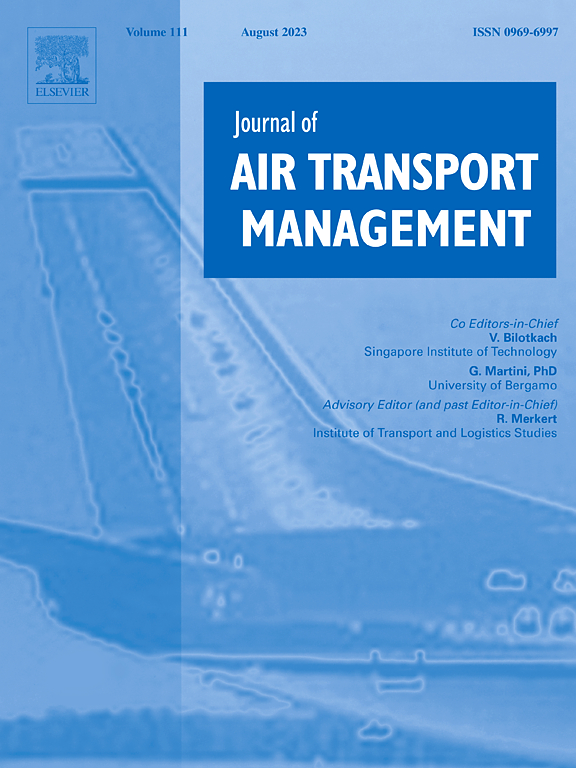Analyzing the impacts on passenger yield of incumbent companies after the entry of a new company into the aviation market: The case of Brazil
IF 3.9
2区 工程技术
Q2 TRANSPORTATION
引用次数: 0
Abstract
The public air transport market is generally oligopolistic, meaning that the market strategies of some companies can influence the decisions of rivals and impact consumer prices. This sector has been marked by a large flow of airline entries and exits. Considering this scenario, the objective of this work is to evaluate how the revenue from airline tickets of incumbent companies in the national aviation market in Brazil was impacted after the entry of a new company. A fixed-effects Difference-in-Differences model (DID) using a feasible generalized least squares (FGLS) estimator with panel data is used to assess this impact. To assess the impact of the entrant on yield dispersion, we apply the regression equation to P90 and P10 of the distribution. We also applied the equation, considering the Gini coefficient as the dependent variable. The results showed that the average income of incumbent companies reduced by an estimated magnitude of 5.9% in the period after the new company entered the market. Our findings also indicate an increase in distribution dispersion in the period following market entry, with a more pronounced reduction of 19% in the P10 and 1.5% in the P90. We conclude that the entry of the new company was readily assimilated by the incumbents, so that the competitive effect can explain the identified reduction in average income. The entry of a new competitor was especially beneficial to consumers in the lower tail of the distribution.
分析新公司进入航空市场后对现有公司乘客收益率的影响:巴西案例
公共航空运输市场通常是寡头垄断的,这意味着一些公司的市场策略会影响竞争对手的决策,并影响消费者的价格。该行业的特点是航空公司的大量进入和退出。考虑到这一情况,本研究的目的是评估巴西全国航空市场上现有公司的机票收入在新公司进入后受到的影响。为了评估这种影响,我们采用了固定效应差分模型(DID),使用可行的广义最小二乘法(FGLS)估计器和面板数据。为了评估新进入者对收益率离散度的影响,我们将回归方程应用于分布的 P90 和 P10。我们还将基尼系数视为因变量,应用了该方程。结果显示,在新公司进入市场后的一段时间内,在位公司的平均收入估计减少了 5.9%。我们的研究结果还表明,在新公司进入市场后的一段时间内,分布离散程度有所提高,P10 和 P90 的下降幅度分别为 19% 和 1.5%。我们的结论是,新公司的进入很容易被原有公司所吸收,因此竞争效应可以解释平均收入的减少。新竞争者的加入尤其有利于收入分布尾部较低的消费者。
本文章由计算机程序翻译,如有差异,请以英文原文为准。
求助全文
约1分钟内获得全文
求助全文
来源期刊

Journal of Air Transport Management
TRANSPORTATION-
CiteScore
12.40
自引率
11.70%
发文量
97
期刊介绍:
The Journal of Air Transport Management (JATM) sets out to address, through high quality research articles and authoritative commentary, the major economic, management and policy issues facing the air transport industry today. It offers practitioners and academics an international and dynamic forum for analysis and discussion of these issues, linking research and practice and stimulating interaction between the two. The refereed papers in the journal cover all the major sectors of the industry (airlines, airports, air traffic management) as well as related areas such as tourism management and logistics. Papers are blind reviewed, normally by two referees, chosen for their specialist knowledge. The journal provides independent, original and rigorous analysis in the areas of: • Policy, regulation and law • Strategy • Operations • Marketing • Economics and finance • Sustainability
 求助内容:
求助内容: 应助结果提醒方式:
应助结果提醒方式:


